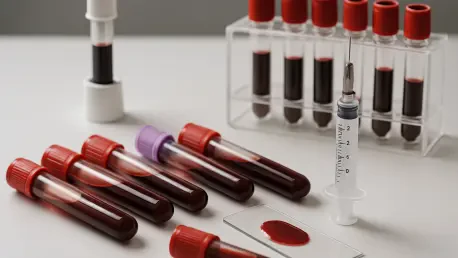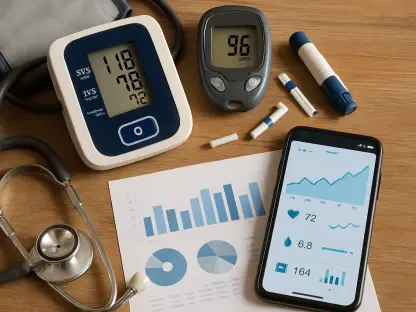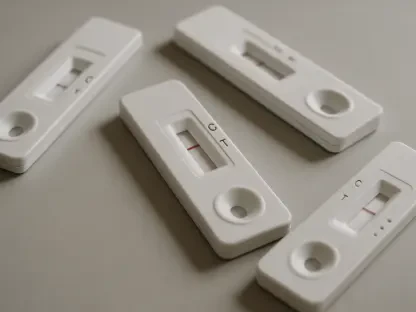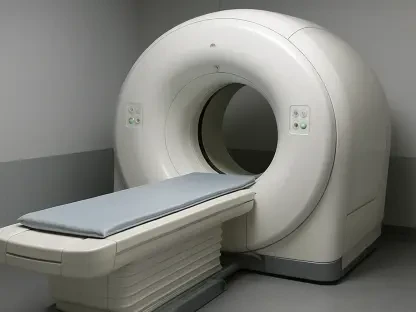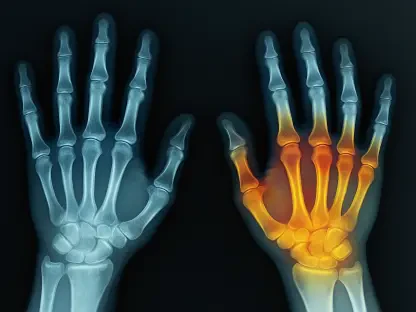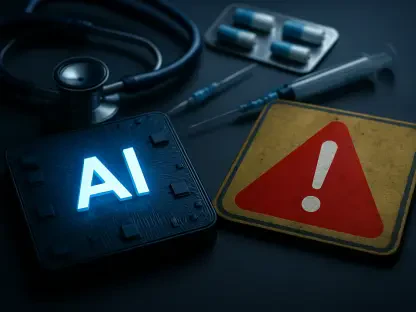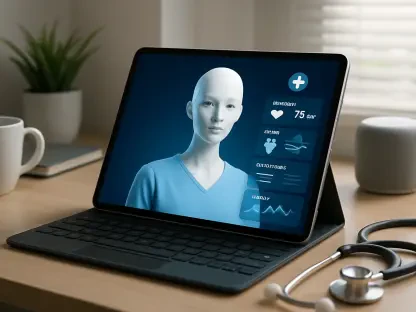In a world where millions grapple with the silent progression of cognitive decline, a staggering statistic reveals that up to 75% of individuals exhibiting symptoms of Alzheimer’s disease remain undiagnosed, often waiting years before seeking answers. This diagnostic delay has long posed a formidable barrier to timely intervention, leaving patients and families in uncertainty while the disease advances. However, a groundbreaking development from Roche, a Swiss-based diagnostics and pharmaceutical giant, offers a beacon of hope. The company has secured CE Mark approval for its Elecsys pTau181 blood test, a minimally invasive tool designed to detect biomarkers linked to Alzheimer’s. Developed in partnership with Eli Lilly, this innovation promises to transform early detection, particularly in primary care settings, by providing a reliable method to rule out the disease and reduce the burden of more invasive procedures. This advancement signals a new era in tackling one of the most pressing health challenges of an aging global population.
Transforming Diagnostics with Innovative Tools
A New Frontier in Early Detection
The Elecsys pTau181 blood test represents a significant leap forward in the fight against Alzheimer’s disease by targeting phosphorylated Tau 181 (pTau181), a biomarker closely associated with amyloid pathology, a hallmark of the condition. Unlike traditional diagnostic methods such as positron emission tomography (PET) scans, which are often costly and inaccessible to many, this blood test offers a less invasive alternative that can be implemented in primary care environments. Clinical studies involving a diverse group of 787 patients worldwide have demonstrated the test’s impressive reliability, with a negative predictive value of 93.8% and a sensitivity of 83.6%. These figures underscore its effectiveness in ruling out Alzheimer’s, potentially sparing countless individuals from undergoing unnecessary and expensive follow-up tests. By streamlining the initial diagnostic process, this tool addresses a critical gap in current healthcare practices, where delayed diagnosis often hinders early intervention and management strategies.
Reducing Healthcare Burdens Through Accessibility
Beyond its clinical accuracy, the Elecsys pTau181 test holds the potential to alleviate significant pressures on healthcare systems globally by reducing the need for specialized diagnostic equipment and procedures. For patients who test negative, the high accuracy of this blood test could eliminate the need for further invasive testing, thereby lowering costs and improving access to care, especially in underserved regions. Matt Sause, CEO of Roche Diagnostics, has highlighted the test’s capacity to provide clarity to patients and caregivers while simultaneously cutting down on expenses for medical systems. This development aligns with a broader movement in the medical community to prioritize accessible and scalable solutions for chronic conditions like Alzheimer’s. As diagnostic delays continue to impact millions, the introduction of such a practical tool in primary care settings could redefine how cognitive decline is assessed, ensuring that more individuals receive timely answers and appropriate care pathways.
Broader Implications for Alzheimer’s Care
Parallel Progress in Therapeutic Research
While the Elecsys pTau181 test marks a pivotal advancement in diagnostics, Roche’s commitment to combating Alzheimer’s extends into the realm of treatment as well. The company is also developing Trontinemab, an antibody drug that has shown remarkable promise in clinical trials by achieving a 91% amyloid plaque removal rate. Plans are in place to conduct two large-scale trials starting this year to further validate the drug’s efficacy and potential impact on disease progression. This dual focus on diagnostics and therapeutics reflects a comprehensive approach to addressing Alzheimer’s, recognizing that early detection must be paired with effective interventions to truly transform patient outcomes. Such efforts highlight the importance of a multifaceted strategy in tackling a disease that continues to affect an ever-growing segment of the global population, particularly as life expectancy rises and age-related conditions become more prevalent.
Global Collaboration and Industry Trends
The significance of Roche’s achievements is amplified by the broader context of international collaboration and innovation within the Alzheimer’s research field. Partnerships, such as the one with Eli Lilly, exemplify the collective push to break down barriers to care and accelerate progress in both diagnostics and treatment. Additionally, recent milestones, like the FDA’s first-ever clearance of a clinical blood test for Alzheimer’s detection, signal a growing momentum toward less invasive and more accessible diagnostic solutions. This wave of innovation underscores a shared recognition among medical and pharmaceutical communities that early and accurate diagnosis is paramount to improving patient outcomes and mitigating the societal impact of the disease. Roche’s contributions, therefore, are not isolated but part of a larger, concerted effort to reshape the landscape of Alzheimer’s care, offering hope to millions who face the challenges of undiagnosed cognitive decline and limited treatment options.
Paving the Way for Future Solutions
Reflecting on a Milestone Achievement
Looking back, Roche’s attainment of CE Mark approval for the Elecsys pTau181 blood test stood as a landmark moment in the journey toward better Alzheimer’s diagnostics. Its ability to rule out the disease with high precision provided a critical tool for clinicians, especially in primary care, where early assessment often made the difference in patient trajectories. Coupled with the ongoing research into therapies like Trontinemab, these efforts painted a picture of determined progress in a field long plagued by diagnostic and therapeutic challenges. The collaboration with industry partners further amplified the impact, showcasing how shared expertise could drive meaningful advancements. This milestone not only addressed immediate needs in detection but also set a precedent for how innovation could bridge gaps in care for complex neurological conditions.
Charting the Next Steps in Care Innovation
As the impact of these developments unfolded, the focus shifted to ensuring widespread access to such cutting-edge tools and treatments. Healthcare systems were encouraged to integrate blood-based diagnostics into routine practice, prioritizing scalability to reach diverse populations. Simultaneously, continued investment in therapeutic research was deemed essential to complement diagnostic gains, aiming for holistic management of Alzheimer’s. Stakeholders across the medical field were prompted to advocate for policies that supported equitable distribution of these innovations, particularly in regions with limited resources. By building on the foundation laid by Roche’s advancements, the global community was positioned to further reduce the burden of undiagnosed cases, paving the way for a future where early detection and effective treatment became the norm rather than the exception in Alzheimer’s care.
